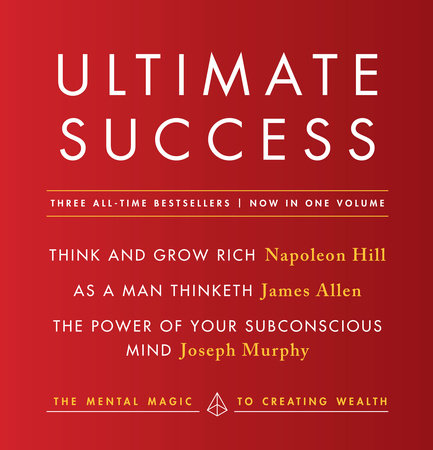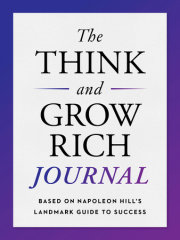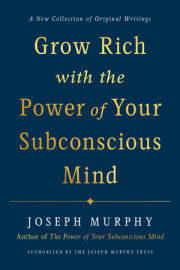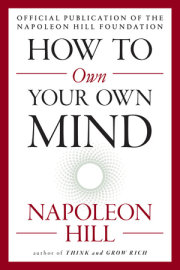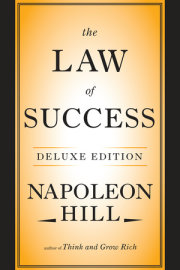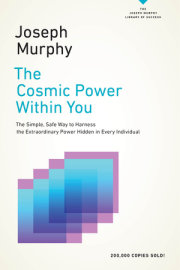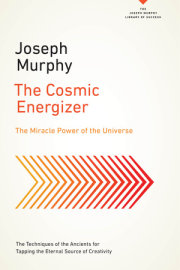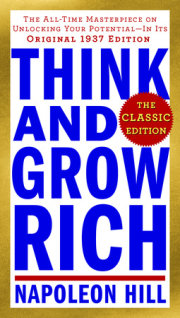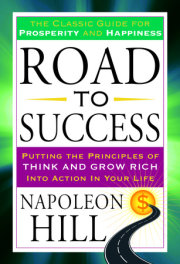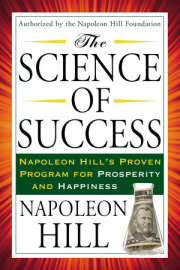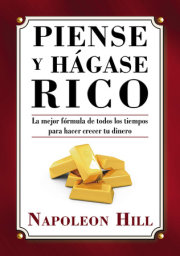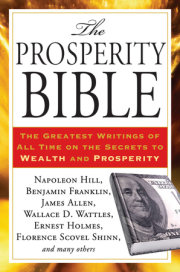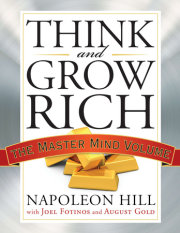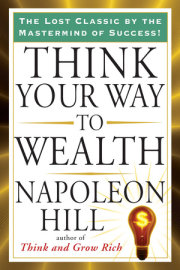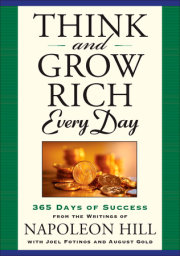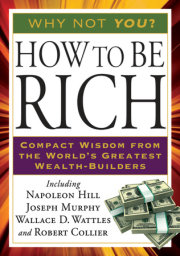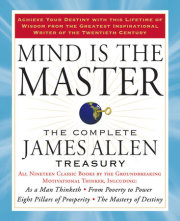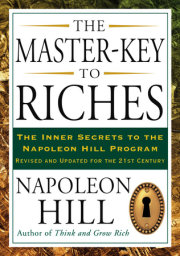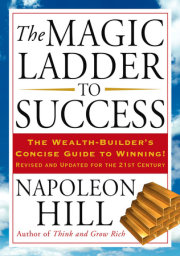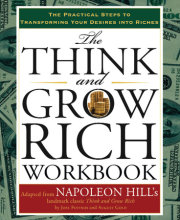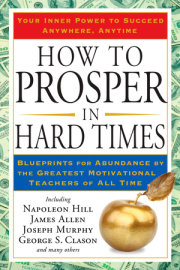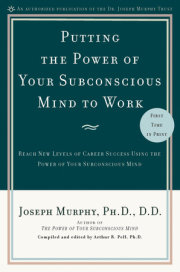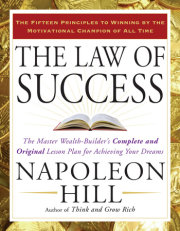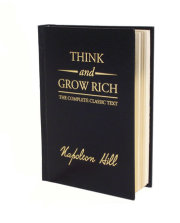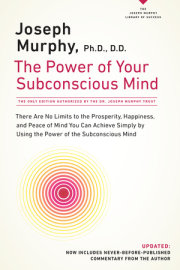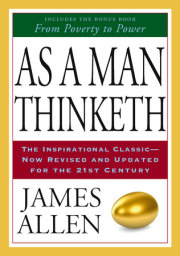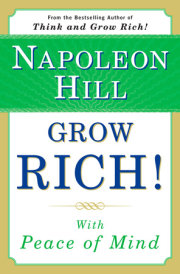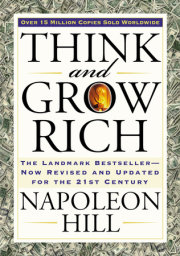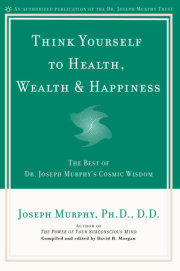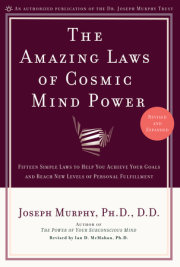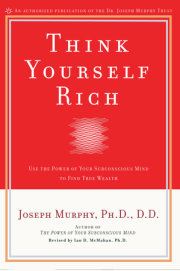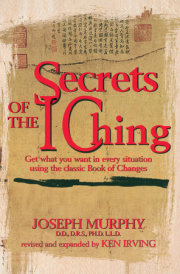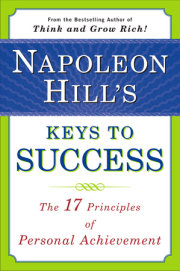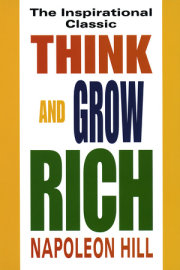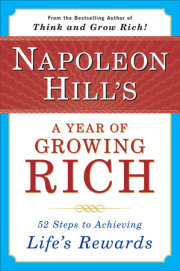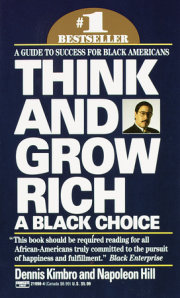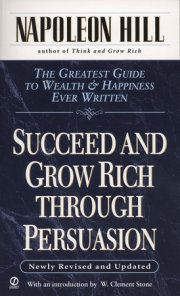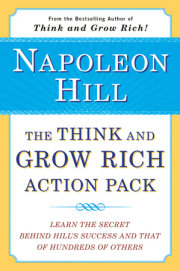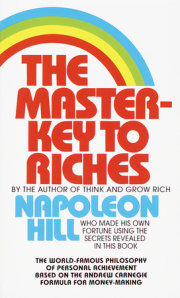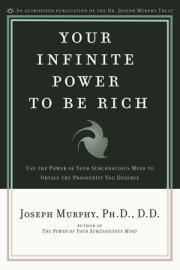CHAPTER 1
Introduction
the man who "thought" his way into partnership with thomas a. edison
Truly, "thoughts are things," and powerful things at that, when they are mixed with definiteness of purpose, persistence, and a burning desire for their translation into riches, or other material objects.
A little more than thirty years ago, Edwin C. Barnes discovered how true it is that men really do think and grow rich. His discovery did not come about at one sitting. It came little by little, beginning with a burning desire to become a business associate of the great Edison.
One of the chief characteristics of Barnes' desire was that it was definite. He wanted to work with Edison, not for him. Observe, carefully, the description of how he went about translating his desire into reality, and you will have a better understanding of the thirteen principles which lead to riches.
When this desire, or impulse of thought, first flashed into his mind he was in no position to act upon it. Two difficulties stood in his way. He did not know Mr. Edison, and he did not have enough money to pay his railroad fare to Orange, New Jersey.
These difficulties were sufficient to have discouraged the majority of men from making any attempt to carry out the desire. But his was no ordinary desire! He was so determined to find a way to carry out his desire that he finally decided to travel by "blind baggage," rather than be defeated. (To the uninitiated, this means that he went to East Orange on a freight train.)
He presented himself at Mr. Edison's laboratory, and announced he had come to go into business with the inventor. In speaking of the first meeting between Barnes and Edison, years later, Mr. Edison said, "He stood there before me, looking like an ordinary tramp, but there was something in the expression of his face which conveyed the impression that he was determined to get what he had come after. I had learned, from years of experience with men, that when a man really desires a thing so deeply that he is willing to stake his entire future on a single turn of the wheel in order to get it, he is sure to win. I gave him the opportunity he asked for, because I saw he had made up his mind to stand by until he succeeded. Subsequent events proved that no mistake was made."
Just what young Barnes said to Mr. Edison on that occasion was far less important than that which he thought. Edison, himself, said so! It could not have been the young man's appearance which got him his start in the Edison office, for that was definitely against him. It was what he thought that counted.
If the significance of this statement could be conveyed to every person who reads it, there would be no need for the remainder of this book.
Barnes did not get his partnership with Edison on his first interview. He did get a chance to work in the Edison offices, at a very nominal wage, doing work that was unimportant to Edison, but most important to Barnes, because it gave him an opportunity to display his "merchandise" where his intended "partner" could see it.
Months went by. Apparently nothing happened to bring the coveted goal which Barnes had set up in his mind as his definite major purpose. But something important was happening in Barnes' mind. He was constantly intensifying his desire to become the business associate of Edison.
Psychologists have correctly said that "when one is truly ready for a thing, it puts in its appearance." Barnes was ready for a business association with Edison; moreover, he was determined to remain ready until he got that which he was seeking.
He did not say to himself, "Ah well, what's the use? I guess I'll change my mind and try for a salesman's job." But, he did say, "I came here to go into business with Edison, and I'll accomplish this end if it takes the remainder of my life." He meant it! What a different story men would have to tell if only they would adopt a definite purpose, and stand by that purpose until it had time to become an all-consuming obsession!
Maybe young Barnes did not know it at the time, but his bulldog determination, his persistence in standing back of a single desire, was destined to mow down all opposition, and bring him the opportunity he was seeking.
When the opportunity came, it appeared in a different form, and from a different direction than Barnes had expected. That is one of the tricks of opportunity. It has a sly habit of slipping in by the back door, and often it comes disguised in the form of misfortune, or temporary defeat. Perhaps this is why so many fail to recognize opportunity.
Mr. Edison had just perfected a new office device, known at that time as the Edison Dictating Machine (now the Ediphone). His salesmen were not enthusiastic over the machine. They did not believe it could be sold without great effort. Barnes saw his opportunity. It had crawled in quietly, hidden in a queer-looking machine which interested no one but Barnes and the inventor.
Barnes knew he could sell the Edison Dictating Machine. He suggested this to Edison, and promptly got his chance. He did sell the machine. In fact, he sold it so successfully that Edison gave him a contract to distribute and market it all over the nation. Out of that business association grew the slogan "Made by Edison and installed by Barnes."
The business alliance has been in operation for more than thirty years. Out of it Barnes has made himself rich in money, but he has done something infinitely greater: he has proved that one really may "Think and Grow Rich."
How much actual cash that original desire of Barnes' has been worth to him, I have no way of knowing. Perhaps it has brought him two or three million dollars, but the amount, whatever it is, becomes insignificant when compared with the greater asset he acquired in the form of definite knowledge that an intangible impulse of thought can be transmuted into its physical counterpart by the application of known principles.
Barnes literally thought himself into a partnership with the great Edison! He thought himself into a fortune. He had nothing to start with, except the capacity to know what he wanted, and the determination to stand by that desire until he realized it.
He had no money to begin with. He had but little education. He had no influence. But he did have initiative, faith, and the will to win. With these intangible forces he made himself number one man with the greatest inventor who ever lived.
Now, let us look at a different situation, and study a man who had plenty of tangible evidence of riches, but lost it, because he stopped three feet short of the goal he was seeking.
Three Feet from Gold
One of the most common causes of failure is the habit of quitting when one is overtaken by temporary defeat. Every person is guilty of this mistake at one time or another.
An uncle of R. U. Darby was caught by the "gold fever" in the gold-rush days, and went west to dig and grow rich. He had never heard that more gold has been mined from the brains of men than has ever been taken from the earth. He staked a claim and went to work with pick and shovel. The going was hard, but his lust for gold was definite.
After weeks of labor, he was rewarded by the discovery of the shining ore. He needed machinery to bring the ore to the surface. Quietly, he covered up the mine, retraced his footsteps to his home in Williamsburg, Maryland, told his relatives and a few neighbors of the "strike." They got together money for the needed machinery, and had it shipped. The uncle and Darby went back to work the mine.
The first car of ore was mined, and shipped to a smelter. The returns proved they had one of the richest mines in Colorado! A few more cars of that ore would clear the debts. Then would come the big killing in profits.
Down went the drills! Up went the hopes of Darby and Uncle! Then something happened! The vein of gold ore disappeared! They had come to the end of the rainbow, and the pot of gold was no longer there! They drilled on, desperately trying to pick up the vein again-all to no avail.
Finally, they decided to quit.
They sold the machinery to a "junk" man for a few hundred dollars, and took the train back home. Some "junk" men are dumb, but not this one! He called in a mining engineer to look at the mine and do a little calculating. The engineer advised that the project had failed, because the owners were not familiar with "fault lines." His calculations showed that the vein would be found just three feet from where the Darbys had stopped drilling! That is exactly where it was found!
The "junk" man took millions of dollars in ore from the mine, because he knew enough to seek expert counsel before giving up.
Most of the money which went into the machinery was procured through the efforts of R. U. Darby, who was then a very young man. The money came from his relatives and neighbors, because of their faith in him. He paid back every dollar of it, although he was years in doing so.
Long afterward, Mr. Darby recouped his loss many times over, when he made the discovery that desire can be transmuted into gold. The discovery came after he went into the business of selling life insurance.
Remembering that he lost a huge fortune, because he stopped three feet from gold, Darby profited by the experience in his chosen work, by the simple method of saying to himself, "I stopped three feet from gold, but I will never stop because men say 'no' when I ask them to buy insurance."
Darby is one of a small group of fewer than fifty men who sell more than a million dollars in life insurance annually. He owes his "stickability" to the lesson he learned from his "quitability" in the gold mining business.
Before success comes in any man's life, he is sure to meet with much temporary defeat, and, perhaps, some failure. When defeat overtakes a man, the easiest and most logical thing to do is to quit. That is exactly what the majority of men do.
More than five hundred of the most successful men this country has ever known told the author their greatest success came just one step beyond the point at which defeat had overtaken them. Failure is a trickster with a keen sense of irony and cunning. It takes great delight in tripping one when success is almost within reach.
A Fifty Cent Lesson in Persistence
Shortly after Mr. Darby received his degree from the "University of Hard Knocks," and had decided to profit by his experience in the gold mining business, he had the good fortune to be present on an occasion that proved to him that "No" does not necessarily mean no.
One afternoon he was helping his uncle grind wheat in an old-fashioned mill. The uncle operated a large farm on which a number of colored sharecrop farmers lived. Quietly, the door was opened, and a small colored child, the daughter of a tenant, walked in and took her place near the door.
The uncle looked up, saw the child, and barked at her roughly, "What do you want?"
Meekly, the child replied, "My mama says send her fifty cents."
"I'll not do it," the uncle retorted. "Now you run on home."
"Yes sir," the child replied. But she did not move.
The uncle went ahead with his work, so busily engaged that he did not pay enough attention to the child to observe that she did not leave. When he looked up and saw her still standing there, he yelled at her, "I told you to go on home! Now go, or I'll take a switch to you."
The little girl said, "Yes sir," but she did not budge an inch.
The uncle dropped a sack of grain he was about to pour into the mill hopper, picked up a barrel stave, and started toward the child with an expression on his face that indicated trouble.
Darby held his breath. He was certain he was about to witness a murder. He knew his uncle had a fierce temper. He knew that colored children were not supposed to defy white people in that part of the country.
When the uncle reached the spot where the child was standing, she quickly stepped forward one step, looked up into his eyes, and screamed at the top of her shrill voice, "My mama's gotta have that fifty cents!"
The uncle stopped, looked at her for a minute, then slowly laid the barrel stave on the floor, put his hand in his pocket, took out half a dollar, and gave it to her.
The child took the money and slowly backed toward the door, never taking her eyes off the man whom she had just conquered. After she had gone, the uncle sat down on a box and looked out the window into space for more than ten minutes. He was pondering, with awe, over the whipping he had just taken.
Mr. Darby, too, was doing some thinking. That was the first time in all his experience that he had seen a colored child deliberately master an adult white person. How did she do it? What happened to his uncle that caused him to lose his fierceness and become as docile as a lamb? What strange power did this child use that made her master over her superior? These and other similar questions flashed into Darby's mind, but he did not find the answer until years later, when he told me the story.
Strangely, the story of this unusual experience was told to the author in the old mill, on the very spot where the uncle took his whipping. Strangely, too, I had devoted nearly a quarter of a century to the study of the power which enabled an ignorant, illiterate colored child to conquer an intelligent man.
As we stood there in that musty old mill, Mr. Darby repeated the story of the unusual conquest, and finished by asking, "What can you make of it? What strange power did that child use, that so completely whipped my uncle?"
The answer to his question will be found in the principles described in this book. The answer is full and complete. It contains details and instructions sufficient to enable anyone to understand, and apply the same force which the little child accidentally stumbled upon.
Copyright © 2018 by Napoleon Hill. All rights reserved. No part of this excerpt may be reproduced or reprinted without permission in writing from the publisher.





